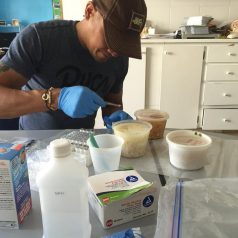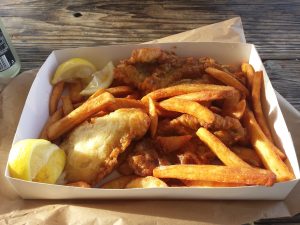
As part of the Save Our Sharks project funded by the Dutch National Postcode Lottery, the St. Maarten Nature Foundation recently discovered that a large majority of fish being sold in supermarkets and restaurants on St. Maarten is being mislabeled. A study was conducted in partnership with the prestigious Smithsonian Institute in Washington DC to research the sale of shark-related products on St. Maarten. Genetic tests were carried out to determine whether sampled food products taken from restaurants, supermarkets, and stores contain shark.

Food products such as swordfish, fish and chips, boneless saltfish, and seafood soup tested positive for shark, including blue shark, shortfin mako shark, silky shark, bigeye thresher shark and scalloped hammerhead shark. The latter three species are listed under Appendix II of the Convention on the International Trade in Endangered Species (CITES), which means their international trade must be regulated to avoid utilization that is incompatible with the survival of the species, and export permits are required by law worldwide. The food products were not harvested locally but were imported to the island and are thought to come mainly from Asia as a waste product from the shark finning industry.
The Nature Foundation also discourages the consumption of shark; several studies have shown that of any seafood, shark contains among the highest levels of the toxic methyl-mercury and other dangerous toxins, which can cause serious health effects. Even small quantities of shark meat can contain large quantities of poisonous methyl mercury, and warnings are issued especially for pregnant women and young children.
Humans are mainly responsibly for the strong declines of sharks, and therefore, one-quarter of all shark species is now threatened with extinction globally. Fishing pressure results in 100 million sharks being killed annually, primarily for the shark finning industry. As large predators, sharks keep the ecosystem in balance by maintaining its natural balance. The serious decline of sharks could have an unforeseen effect to the coral reef ecosystem and everything that depends on it, as for instance fisheries, and dive and beach tourism.
This issue is quite serious for the island and for the region. St. Maarten is an important hub in the tourism industry and large quantities of fish are sold in restaurants, especially during high season. Not only do the results of this study show that shark is being sold as other fish, it shows that there is a significant mislabeling, whether deliberate or not, of fish products being sold to the consumer. Instead of being served a swordfish clients are now being served an endangered species that is regulated by law and that may have harmful effects on the health of the consumer. The Nature Foundation has been in contact with the authorities, stores, wholesalers and restaurateurs in order to find a way to curb this situation.





